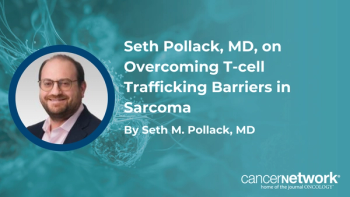
NXC-201 Yields Complete Responses in Relapsed/Refractory AL Amyloidosis
Findings from the phase 1b/2 NEXICART-1 study indicated that NXC-201 produced complete responses in 6 evaluable patients with relapsed or refractory AL amyloidosis.
The investigational CAR T-cell therapy NXC-201 (formerly HBI0101) demonstrated complete responses (CRs) in a small population of patients with relapsed or refractory AL amyloidosis treated to-date in the phase 1b/2 NEXICART-1 study (NCT04720313), according to a press release from Nexcella.1
Among 6 patients with relapsed or refractory AL amyloidosis, NXC-201 continued to yield a CR rate of 100% following a previous publication of clinical data from the trial in December 2022.2 At a median follow-up of 5.2 months (range, 2.5-9.5 months), the organ response rate was 100%, and the duration of response had not been reached.
“As we enroll additional patients, we continue to be encouraged by the consistent 100% CR rate for [patients with] AL amyloidosis treated with NXC-201 to-date,” Gabriel Morris, president of Nexcella, said in the press release.
AL amyloidosis is a rare systemic disorder in which misfolded amyloid proteins produced by plasma cells build up in and around tissues, nerves, and organs, gradually affecting their function and causing progressive organ damage and high mortality rates.
Investigators of the ongoing, open-label phase 1b/2 NEXICART-1 study are evaluating the efficacy and safety of NXC-201, a BCMA-targeted, structurally differentiated CAR T-cell therapy, in adult patients with relapsed or refractory plasma cell dyscrasias, including multiple myeloma and AL amyloidosis.
In phase 1b of the study, the primary end points included safety, maximum tolerated dose, and recommended phase 2 dose of NXC-201. Secondary end points for the phase 2 portion of the study included overall survival, progression-free survival, and response rates.
Patients 18 years and older with a voluntarily signed informed consent form; an ECOG performance status of 0 to 2; and a diagnosis of multiple myeloma with relapsed or refractory disease following 3 prior lines of treatment including a proteasome inhibitor, immunomodulatory therapy, and at least 1 antibody therapy were eligible to enroll on the trial.
Additional inclusion criteria included having measurable disease, recovery from grade 2 or lower non-hematologic toxicities due to prior treatments, and an ability and willingness to adhere to the study visit schedule and all protocol requirements.
At the time of the publication of clinical trial data, 4 of 4 patients had cardiac involvement at baseline echocardiogram reading as defined by N-terminal prohormone of brain natriuretic peptide (NT-proBNP) levels of higher than 100 pg/ml (range, 119-7500). Trial investigators also reported a 65% (2656 pg/ml) mean reduction in NT-proBNP levels from baseline and a 2-stage improvement in New York Heart Association staging among patients treated with NXC-201.
Trial investigators observed no incidence of grade 4 cytokine release syndrome (CRS) or immune effector cell–associated neurotoxicity syndrome among patients treated with NXC-201. Low-grade CRS had a median duration of 2 days (range, 1-4) with median onset occurring on day 2 (range, 1-3).
References
- Nexcella, Inc. announces additional positive NXC-201 clinical data demonstrating 100% complete responses in relapsed/refractory AL amyloidosis patients, duration of response not yet reached. News release. Nexcella. January 6, 2023. Accessed January 9, 2023. bit.ly/3k1Q6AJ
- Kfir-Erenfeld S, Asherie N, Grisariu S, et al. Feasibility of a novel academic BCMA-CART (HBI0101) for the treatment of relapsed and refractory AL amyloidosis. Clin Cancer Res. 2022;28(23):5156-5166. doi:10.1158/1078-0432.CCR-22-0637
Newsletter
Stay up to date on recent advances in the multidisciplinary approach to cancer.





































